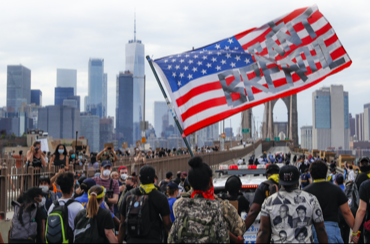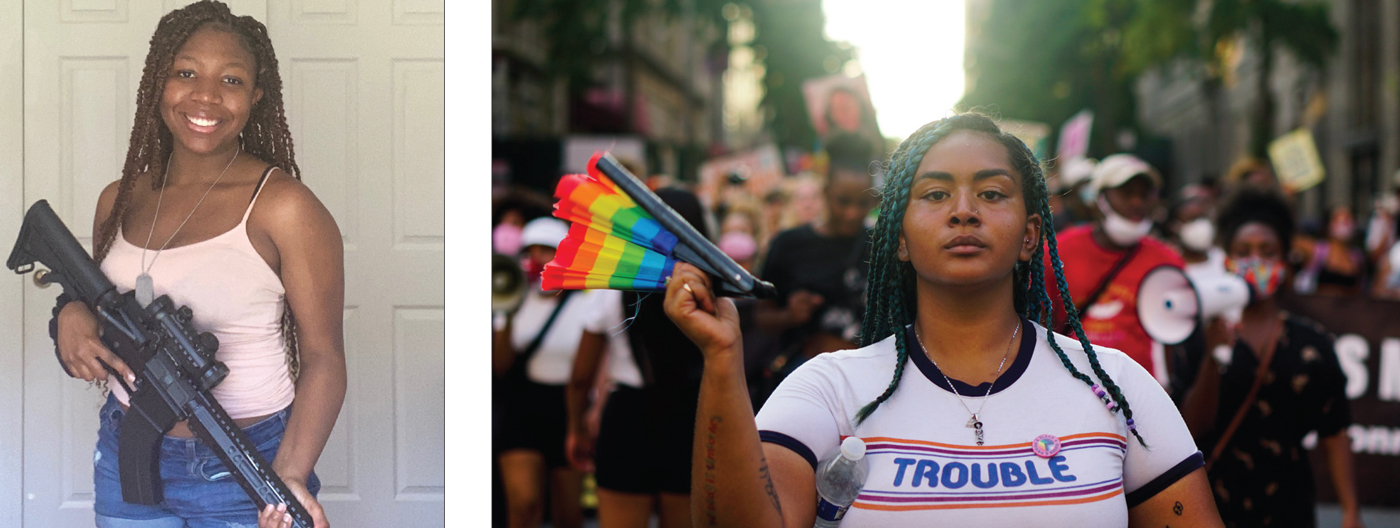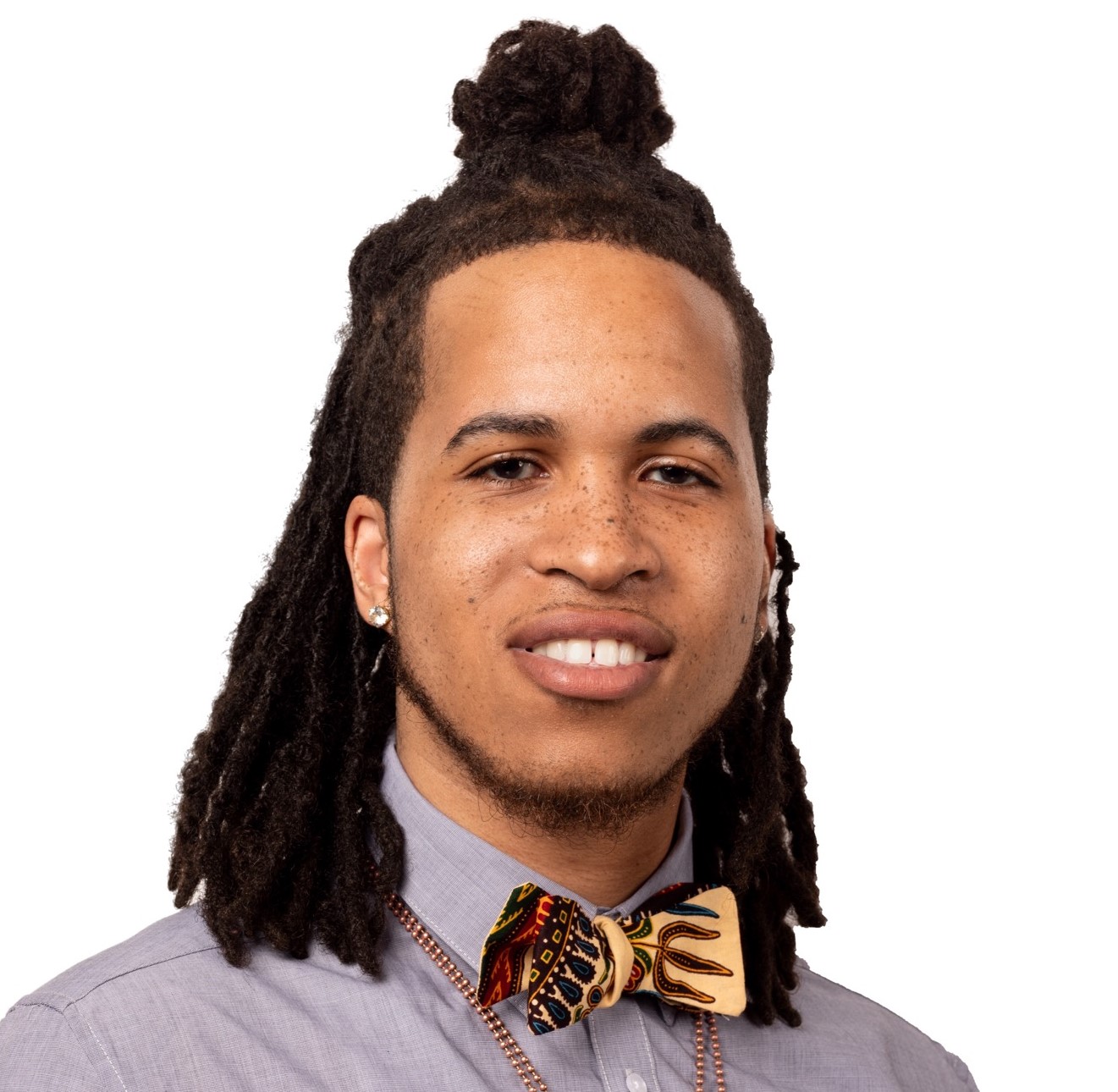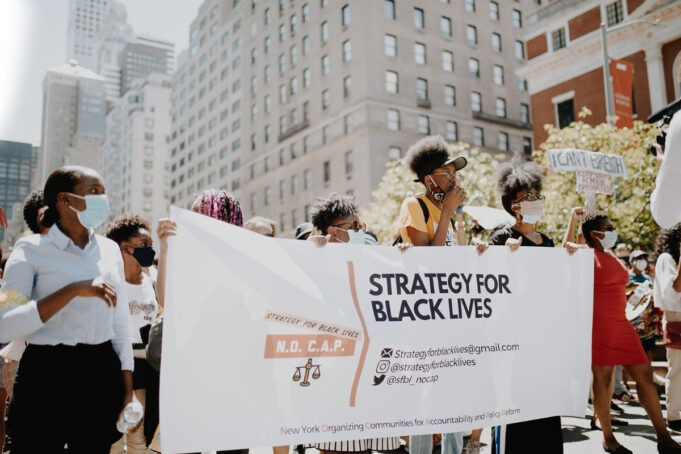As America stands on the brink of collapse with a pandemic she has no idea how to handle, a financial crisis, a looming housing crisis, police brutality and other problems, young Black activists describe the 2020 election as pivotal.
Many Black people in the United States have the goal to vote out President Donald Trump, and young people are on board with that idea and are hopeful about Democratic presidential candidate Joe Biden and his pick of Kamala Harris as his vice presidential running mate. At the same time, they say that’s not enough.

“I definitely feel like it’s a pivotal election, probably one of the biggest ones that we’ve seen in our lifetime. We definitely do not want a repeat of the last four years, so this is definitely a time where we’re trying to rally everyone to get to the polls, get registered to vote and really complete their civic duty,” said Jerrell Gray, a youth activist with the organization Strategy for Black Lives.
But he recognized that many people were upset about having Biden as an option.
“A lot of people were kind of depressed with the option we were given, given Biden’s history with the criminal justice system, some of his moderate claims, some of his outdated claims. And then Kamala Harris’s spotty record as District Attorney of San Francisco and some of her portion as Attorney General,” he said.
He’s still hopeful because of the progressive things Harris has done in the past, such as bringing lawsuits to major corporations like JPMorgan, advocating for LGBTQ rights and supporting the Development, Relief, and Education for Alien Minors (DREAM) Act.
“I know that a lot of people are upset with her background, and rightfully so. We should be upset because young Black activists are on the progressive forefront. We’re trying to break barriers. We’re trying to uproot the system that has held us down for so long. But this is why we’re in a democracy. This is why we’re activists. This is why we have a voice. We have to pressure these individuals,” he said.
Criminal justice reform is one major issue on the minds of Black youth.
“I hope Kamala and Joe Biden could have a stronger plan or a more visible plan on criminal justice reform,” said Nate Tinbite, an 18-year-old activist who served on the Montgomery County, Maryland Board of Education.
According to Pew Research, in 2017, Black people represented 12 percent of the U.S. adult population but 33 percent of the sentenced prison population. For Mr. Tinbite, criminal justice reform means having a system where Black people are not disproportionately imprisoned.
“That means that we are creating a police force that doesn’t use excessive force, that, as we’ve seen with George Floyd, doesn’t chokehold people,” he said. “We see a justice system that doesn’t unfairly discriminate [against] people of color as we’ve seen Black men.”

When he was on the school board, he brought forward a resolution that called for the removal of school police officers because of the disproportionate affect they had on Black students.
“I think in terms of criminal justice reform, we don’t need to just think about the federal justice system or federal prisons but everything and anything. School suspension. The way that an officer might pull you over without improbable cause. It’s the reimagining of our policing in America,” he said.
Mr. Gray would also like to see criminal justice reform.
“When we say ‘defund the police,’ it’s not only defund. It’s defund and there’s a fill-in-the-blank. It’s defund and reinvest back into our communities. Especially in New York City, the NYPD has a tremendous budget,” the Brooklyn activist said.
He said he would like to see the NYPD budget reduced and reinvested into education, infrastructure, public transportation and public services.

Prison reform and mass incarceration, including the school-to-prison pipeline, are issues Cameron Bertrand would like to see addressed. That includes reentry into society, opportunities for enrichment, work-force development and mental health services.
“It should not be the goal to keep people in the system of what is literally modern-day slavery,” he said.
Mr. Bertrand is the CEO of Violence Intervention and Prevention VIP, LLC, and he is the founder of the organization Buy Back the Block. He ran for the school board in Virginia in order to increase representation. As someone who ran for office, accountability is important to him.
“There’s a lot of debate about what [Kamala Harris’] views might be, her impact on prison reform and mass incarceration. I believe it’s very important that if we do see any possible conflict in that arena, then we need to make sure that we’re being a part of the solution. Bring solutions to the table and hold our elected officials accountable for the solutions that have been expressed by the community for the community,” he said.
He said that both Biden and Harris need to align with community-based and grassroots organizations in order for his trust in them to solidify.
“That will solidify the work that I believe they’re capable of doing. But I don’t believe they’re capable of doing anything alone. I believe that we need to align with our community to actually do the work that needs to be done in our community, and I believe that needs to be the shift,” he said.

Twenty-year-old climate and racial justice organizer Andrea Manning from the Atlanta-metro area plans on voting, but she said she doesn’t quite see the power that people believe comes from the system.
“When I say that I’m going to vote, I say that with an ‘and’ behind it. I say, ‘I’m going to vote AND I’m going to continue doing the work I do in the community,’” she said. “And I guess I say that because like yes, Harris is on the Democratic ticket and might help to push more climate legislation that we probably aren’t going to get with Biden. However, I recognize a lot of the root issues that are at play with this, and I realize that incremental changes that they can make are important, but it’s not going to solve the problem and it might not even get us close to solving it.”
She doesn’t think Black people will see the changes or the progress that they’re looking for. One of her major concerns about the Biden-Harris ticket is their past work regarding policing.
“Harris herself and the work that she did back in California, it didn’t help the community at all. And if you go back and look at some of the stuff that she’s said and some of the features that she’s given and just some of the stuff that she signed on to, it’s been harmful. It can be harmful,” she said. “Same thing with Biden. Just in all honesty, they are definitely the lesser of two evils, them vs. Trump/Pence. However, that does not absolve them of the evils or the harms that they have put in our communities, so I don’t expect to see anything exciting from them in terms of police accountability.”
She said people are excited about the Biden-Harris ticket because Harris seems to represent herself as a Black and Indian woman and that if they were to win, it would be historic.
“My main concern is people being ‘Ok, Trump is out of office’ and being relieved and not investing more time and work into their community. Like, Trump is not good at all, but also we should not stop at getting him out of office,” she said. “We should not stop at getting a Black woman into office. That’s not going to solve our problem. And so I guess my biggest concern actually ties back to the community response to the ticket and to their potential winning.”
Ms. Manning said White voters could be looking at Kamala Harris and either approaching from a feminist view or are looking at her saying she’s what is needed following the national protests.
“Interesting perspective. For me, very far off. For me, she honestly represents the opposite of what we were protesting for, because she is very much a glorified cop,” she said.
Only 47 percent of Black people under 30 years old confirmed they would be voting for Biden, and 73 percent confirmed they would vote for him if he picked a Black woman as his running mate, according to a July report by American University.
Jordan Goodwin, a 19-year-old Black woman from Gary, Indiana who has been vocal about Kamala Harris on Twitter does not plan on voting. She said she has zero faith in Biden and Harris.
“He looks like he’s going to drop dead at any second every time we see him on TV, and he has a history of racism and White supremacy,” she said. “Harris has specifically stated that she will not do anything specifically for Black people, and she also has a history of upholding White supremacy in the justice system.”
Some of the biggest long-term issues she wants addressed are reparations, closing the wealth gap for Black people, healthcare and criminal justice reform. But she said Black people do not owe anyone an explanation for their vote.
“Our vote is always policed. I just say we should vote our values, and our ancestors fought for the right for us to have a choice. We don’t specifically have to vote, and there will be a president whether you vote or not,” she said.
For Cherish Patton, a young Black woman from New York, getting President Trump out of office is a driving motivation.
“Another four years with this very racist, spawn-of-Satan president we have would be something that this country won’t be able to recover from,” said Ms. Patton, founder of The Descendants, an organization dedicated to Pan-Africanism and Black liberation.
The biggest issues for her are trans people’s rights, the appointing of new judges and more going into the fight for Black lives, specifically seeing Breonna Taylor’s murderers arrested and charged.
“Every couple of years we see a Black person murdered at the hands of White supremacy. We come to the streets. We protest, we get angry and then we go inside and that’s the end of it. And then we go home and continue our normal lives, but guess what? Breonna Taylor was living her normal life,” she said. “Your normal life, it’s still affected by White supremacy. Breonna Taylor lost her normal life. She’s not a martyr. She wasn’t fighting this fight. Breonna Taylor was living her normal life when she was murdered at the hands of White supremacy.”
Her biggest concern about Kamala Harris is her involvement in the school-to-prison pipeline.
“The system has a way of making Black people use the system once they’ve worked their way up in it to oppress their own people,” she said.
Kamala Harris’ background as the daughter of an Indian woman and a Jamaican man recently entered public conversation.
“To be clear, I don’t think it’s a great thing that this person who’s posing to be pro-Blackness, who’s like ‘oh, the Black woman candidate’ is actually the daughter of an Indian woman, because at the end of the day, Indian people are prejudiced towards Black people,” Ms. Patton said, who has heard testimonies about the problem from her Indian friends. “And her father was Jamaican. Your father wasn’t African-American. What is your African American experience? And your hair is always straight. Your hair is always straight. What are you saying to Black people, Black women, Black girls that are looking up to you?” she questioned.
Mr. Gray’s main concern about Biden and Harris is health care and their lack of adamant support for reparations.
“Kamala originally supported Bernie Sanders’ health care for all, universal health care, and then she retracted and brought her own plan that had private options and that was really complicated,” he said. “We really want to see progressive change, and a lot of people are not confident that they will bring the progressive change that we want to see.”
Mr. Bertrand commented on how many Black people forget about the elections in between the presidential election.
“I want people to recognize the fact that a lot of what we express doesn’t fall on the presidential election. It falls on our local elected officials, our Congress, our delegates and our city council to do the work that we would like to see in our community, and seeing people step up to the plate and actually step into those positions, we need to see representation there,” he said.
In emphasizing the importance of community work, Ms. Manning quoted a tweet from @ChaniceALee: “Regardless of who is President/VP, what are *you* doing to change the material conditions of your community? Where will you be after Nov. 3 when folks are still houseless, people are still hungry, Black youth are still murdered by the police, & Black trans people are still dying?”
“And I think that’s super, super important. Not just after the election but today. What are you doing today? What are you investing in today in your community?” the 20-year-old questioned. “Ultimately, no ticket is going to save us because we cannot expect a system itself to save us.”













